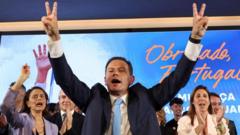In this latest election, the Democratic Alliance emerged victorious but continues to grapple with a lack of majority power, forcing Montenegro to promise a commitment to stimulating investment alongside ensuring social justice and prosperity for all citizens. The loss of seats by the Socialist party has positioned Chega, a relatively new contender, to potentially overtake them in the final tally, especially given the outstanding international polling results that may favor Chega's agenda focused on immigration issues and governmental transparency.
The recent political climate has been further complicated by scandals involving previous administrations, which have fueled public disillusionment and party fragmentation. Montenegro's victory speech focused on expressing gratitude to both his family and supporters who rallied around him during controversies surrounding his previous business dealings. In contrast, Santos's resignation speech was poignant, indicating a continued belief that Montenegro lacks the qualifications for effective leadership, showing a deep division in Portugal's current political atmosphere.
With ongoing scrutiny about the efficacy of leadership in addressing pressing issues, such as corruption and immigration, the upcoming months will be critical in determining how the Democratic Alliance, Socialist Party, and Chega interact and navigate this shifting political landscape in Portugal.
The recent political climate has been further complicated by scandals involving previous administrations, which have fueled public disillusionment and party fragmentation. Montenegro's victory speech focused on expressing gratitude to both his family and supporters who rallied around him during controversies surrounding his previous business dealings. In contrast, Santos's resignation speech was poignant, indicating a continued belief that Montenegro lacks the qualifications for effective leadership, showing a deep division in Portugal's current political atmosphere.
With ongoing scrutiny about the efficacy of leadership in addressing pressing issues, such as corruption and immigration, the upcoming months will be critical in determining how the Democratic Alliance, Socialist Party, and Chega interact and navigate this shifting political landscape in Portugal.



















